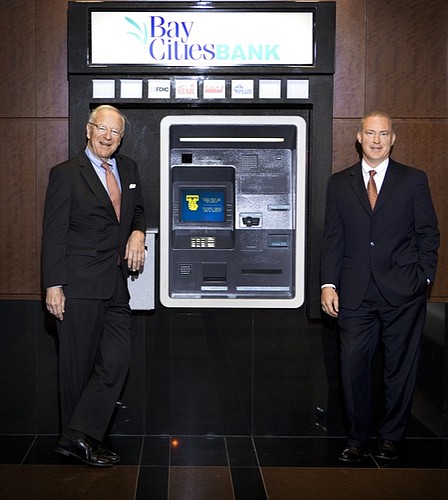- December 23, 2024
-
-
Loading

Loading

At a time when bank access to capital is nearly nonexistent, Tampa-based Bay Cities Bank has managed to raise $21.2 million in new funding.
A stock offering initiated last fall, seeking $5 million to $20 million, ended up being oversubscribed by current and new investors.
The old adage still applies that you can always get money when you need it least, but executives with the 10-year-old bank believe the success of the capital raising efforts may be a result of business owners' disenchantment with major banks. Even with only six branches in the Tampa Bay market, it has managed to exceed the $500-million mark in assets and grow its average deposits by 7% over the past year.
“It validates our strategy and our plan,” says Greg Bryant, Bay Cities' president and CEO. “The reason (other) banks are having such a hard time raising money is because investors aren't sure what they're getting.”
From its inception in late 1999, Bay Cities Bank aimed to serve three main customer groups: small businesses, high net-worth individuals, and professionals such as doctors and lawyers. Its focus has been on organic growth, though Bryant says technology has helped quite a bit over the past decade.
The bank places a strong emphasis on remote deposit capture, which allows customers to move funds electronically without physically having to bring money to a branch. Bryant cites key remote customers as close as Palm Harbor and as far away as Buffalo, N.Y.
“Tech has leveled the playing field for banks,” Bryant says. “We don't need 15 or 20 offices to get coverage today. We have a courier service that takes the bank to our customers.
Besides its Westshore headquarters at Corporate Center Four at International Plaza, Bay Cities' other offices are in South Tampa, Carrollwood, Lutz, Oldsmar and St. Petersburg, and an additional branch is being considered in mid-Pinellas County, he says. Even with one branch, the bank has a fairly strong Pinellas presence with about $50 million in deposits and $40 million worth of commercial loans. A tenth of Bay Cities' shareholders live in Pinellas, as does one of its 17 directors, Clearwater auto dealer Lawrence H. Dimmitt III.
However, Bay Cities is not raising capital or branching out purely for the sake of getting bigger. While the new money puts the bank in a position to be able to buy any community banks within Florida that may fail this year, Bryant says its plan will be to “play offense rather than defense” in terms of troubled loans.
Bay Cities was aggressive last year in writing down bad loans, which resulted in its current three-star rating (out of five) by BauerFinancial Inc., based in Coral Gables. Bryant says the bank is in fine shape overall and can withstand losses up to $14 million in a worst-case scenario. The bank also fares better in asset quality than the majority of its banking peers in Florida, and has more than double the minimum 1.25% in loan-loss reserves that is considered ideal for community banks.
Although the bank is heavily weighted in commercial real estate as part of its overall $285-million loan portfolio, Bryant isn't too concerned. “If you're banking in Florida, you're going to have to be involved in real estate,” he says.
From the deposit side, Bryant says Bay Cities gained $15 million through this year's first quarter, likely a benefit of growing consumer disenchantment with mega-banks and the takeover of two smaller banks with a large Bay area presence, Colonial (now BB&T) and Washington Mutual (now Chase). Bay Cities' total deposits through the first three months of 2010 are nearly $430 million, while assets now exceed $510 million.
Bronson Thayer, Bay Cities chairman who previously headed First Florida Bank before it became part of Barnett Bank (now Bank of America) in 1992, believes the overwhelming response to the bank's latest stock offering validates its original goals and allows it to continue on that path. “The best thing we can do is run the very best bank we can, and this allows us to do that,” he says.
Incidentally, the economic downturn caused Bay Cities to adjust its future plan, taking it from buyout to buyer. Thayer says the bank's organizers didn't envision making it through a full 10 years before being purchased by a larger banking concern, thus providing a nice return for its eight original directors, all of whom remain on board.
“We're content to grow the bank despite these challenging times,” Thayer says. “Our game plan changed, and I'm glad it did.”
— Carl Cronan